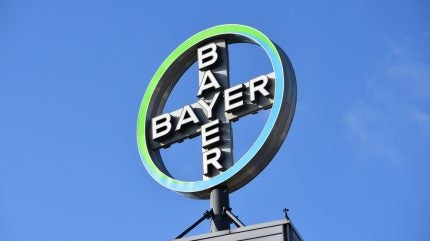
Bayer’s retinal disease treatment Eylea (aflibercept) is set for an extended treatment interval, a label extension that could give the drug an advantage over rival Roche’s Vabysmo (faricimab).
A committee for Medicinal Products for Human Use (CHMP) of the European Medicines Agency (EMA) has issued a positive opinion that would allow 8mg of Eylea to be injected in intervals of up to six months.

Discover B2B Marketing That Performs
Combine business intelligence and editorial excellence to reach engaged professionals across 36 leading media platforms.
Shares in the German big pharma company rose 1% at market open on 23 May following the announcement. Bayer’s market cap is $21.5bn.
Although Eylea is approved in four indications in Europe, the label extension will only be eligible for two conditions, notably neovascular (wet) age-related macular degeneration (nAMD) and diabetic macular oedema (DME).
The European Commission will now mull over CHMP’s opinion with a decision “expected within the next weeks”, according to Bayer, which licensed the rights to the drug outside the US from manufacturer Regeneron in 2012.
Despite Eylea reaching the market first, Roche has eroded a stake of Bayer’s market share with its bispecific antibody Vabysmo. Similar to Eylea, Vabysmo is approved for a range of retinal diseases but has higher uptake due to the longer intervals between injections.

US Tariffs are shifting - will you react or anticipate?
Don’t let policy changes catch you off guard. Stay proactive with real-time data and expert analysis.
By GlobalDataVabysmo generated $4.3bn in sales in 2024, becoming one of Roche’s top-selling drugs. Whilst Eylea and Eylea 8mg – the latter known as Eylea HD in the US – reached combined sales of $9.5bn in 2024, year-over-year growth was lower than Vabysmo. Regeneron and Bayer are also having to contend with a market influx of biosimilars.
Therefore, an extended treatment interval could be a major step for Bayer in maintaining its market share. The positive judgment by the committee was based on positive three-year results from open-label extension studies of the pivotal clinical trials PULSAR (NCT04423718) and PHOTON (NCT04429503) in nAMD and DME, respectively. Eylea 8mg demonstrated that it could maintain visual and anatomic improvements at dosing intervals of six months. Across both studies, 24% of patients in nAMD and 28% of patients in DME had a last assigned dosing gap of six months at the end of the three years.
The long-term data did not show any new safety signals, and the rates of ocular treatment-emergent adverse events (AEs) were similar across patients switching from 2mg to 8mg of Eylea.
Eylea works by inhibiting vascular endothelial growth factor (VEGF), which prevents abnormal blood vessel growth. With the label extension, Eylea 8mg would be the only anti-VEGF approved for a treatment interval of six months. Roche’s Vabysmo became the first bispecific antibody approved for the eye. It acts by neutralising angiopoietin-2 (Ang-2) and VEGF-A.
Bayer’s global product strategy and commercialisation executive vice-president Christine Roth said: “Following approval of the European Commission, extended treatment intervals with Eylea 8mg of up to six months can significantly reduce the frequency of injections and visits to the clinic for patients.
“These extended intervals, combined with the unique product profile of Eylea 8mg, position it to become a new standard of care for retinal diseases.”




